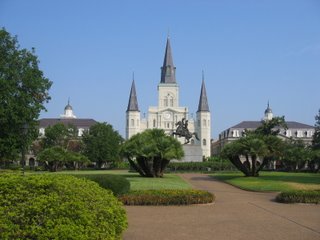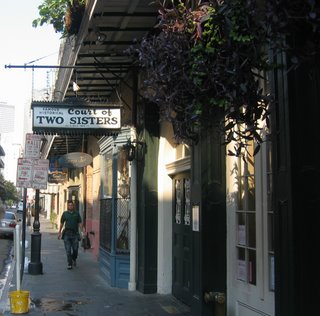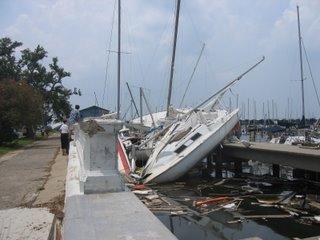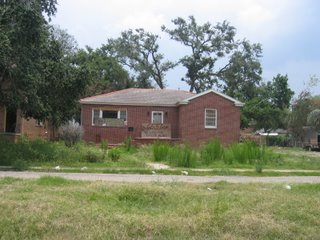Do not lose your inner peace for anything whatsoever, even if your whole world seems upset.
St. Francis De Sales
(1567- 1622, Roman Catholic bishop, writer)
Tuesday, December 05, 2006
Monday, September 04, 2006
Tuesday, August 15, 2006
Great Quotes
When we lose the right to be different, we lose the privilege to
be free.
Charles Evans Hughes
be free.
Charles Evans Hughes
Saturday, July 15, 2006
A Visit Home 10 Months After Katrina

I went back to New Orleans a couple of weeks ago for a wedding. I hadn't been there since May of 2005. I knew the city was devastated, but the actual experience of it was surreal. Coming from Florida, Interstate 10 passes through New Orleans East.

The 12 miles, from the now closed Six Flags Amusement Park to the Vieux Carre exit off I-10 resembled the typical ghost town in a science fiction Doomsday movie.
We stayed in the French Quarter, which experienced only minor physical damage, but has a noticeable amount of businesses that have yet to reopen; for various reasons, including a shortage of employees due to lack of housing.

The food and drinks at places like Coops on Decatur, Court of Two Sisters (Jazz Brunch), Cafe Du Monde, Pat O'Briens, etc., was still great, but there was a difference in the mood of the city. I don't mean the people. We had good and bad service (mostly good) at restaurants and other establishments, but the city seemed a living entity, in a state of shock, or depression. It wasn't just the usual New Orleans sweltering summer heat, it was more intense than that, weighing one's own mood down.
The obvious areas of devastation look as if the storm hit just days

ago instead of 10 months ago. Even the lightly damaged areas like the Garden District had a depressed look, or feel, like the city's physical exterior was expressing what its residents are experiencing emotionally. If New Orleans was admitted to a hospital it would be on the critical, but stable list, barring any more complications, like getting hit by another large storm.

In the past, New Orleans survived yearly, yellow fever epidemics that decimated the population. At the Battle of New Orleans an overwhelming, elite military force of British regulars, was defeated with an unusual, but typically New Orleans gumbo, of soldiers, pirates and civilian volunteers of mixed racial and social status. We can only hope the overwhelming forces currently confronting New Orleans, will also be defeated, with the help of all those who truly care for "The City That Care Forgot".

Saturday, March 04, 2006
Mardi Gras And A Pair Of Beads On The Ground
As I watched CNN's all day coverage of Mardi Gras in New Orleans, I wondered where the reporters got their info about why parade watchers didn't pick up beads or other Carnival throws that missed their hands and fell to the ground. They kept referring to it as if it was some philosophical tradition of New Orleaneans; that the thrill or challenge was in the “catch”, not in the item itself. Wrong!!! I can only think they spoke with people from "uptown", like lawyers, or other "high society" types, who grew up in the Garden District, or 30 something and younger individuals who didn't experience Mardi Gras back in the 50's and 60's. During those years, people would scramble for beads that landed on the ground, like fans at the World Series diving for a baseball that lands in the crowd.
There were a couple of reasons why this "diving for trinkets" died over the years. Older and taller parade goers would often attempt to step on beads they missed catching in their hands, called the “stomp and retrieve” maneuver, with the result being that a lot of kids, lacking the height for catching in the air, but the advantage of being closer to the ground, had their fingers crushed. I think New Orleans lost a lot of potential piano and guitar players during that era.
The second reason we no longer “fought” for grounded beads, is parade krewes started to throw a lot more stuff than they use too. As a kid, if I went home with a handful of beads and a few "crappy" plastic trinkets, I considered it a decent haul. Now you can often fill a large kitchen garbage bag full of beads, doubloons, stuffed animals,plastic cups, etc. from one average size parade. In other words, as the rich got richer, besides being able to buy a bigger home in the Garden District, they could also purchase more junk to throw to the masses during Mardi Gras; known as the trickle or “trinket” down effect by those who support huge tax breaks for the super affluent. Also, as the years progressed, a lot of Carnival parade krewe members, now came from the working class, and they remembered what it was like down on the streets. So, they too, increased the amount of "throws" to the crowd. With bead sacks now filled to the bursting point there is no need to scrounge for anything that hits the ground.
I was also surprised none of the CNN reporters, or any of the local news or celebrity personalities that appeared on the all day broadcast used or mentioned the term “a pair of beads”. True New Orleaneans don't refer to Mardi Gras beads as “strands of beads”. Even one strand of beads is called a “pair of beads” I don't know how or why we came to use that term. In fact, up until about a month ago, I never realized there was anything peculiar or wrong, mathematically speaking, in the expression. It wasn't till I read a novel by Julie Smith “New Orleans Mourning” that she brought up this particular quirk in the New Orleans vocabulary. Because this expression, was such a subtle deviation from the norm, unlike “banquette” which is what we still called a “sidewalk” back in the 50's (Rarely heard nowadays) that I never realized this was another one of those typical New Orleans lexicons that unfortunately, may be passing out of the city's culture. Thank God we still have our neutral grounds!
There were a couple of reasons why this "diving for trinkets" died over the years. Older and taller parade goers would often attempt to step on beads they missed catching in their hands, called the “stomp and retrieve” maneuver, with the result being that a lot of kids, lacking the height for catching in the air, but the advantage of being closer to the ground, had their fingers crushed. I think New Orleans lost a lot of potential piano and guitar players during that era.
The second reason we no longer “fought” for grounded beads, is parade krewes started to throw a lot more stuff than they use too. As a kid, if I went home with a handful of beads and a few "crappy" plastic trinkets, I considered it a decent haul. Now you can often fill a large kitchen garbage bag full of beads, doubloons, stuffed animals,plastic cups, etc. from one average size parade. In other words, as the rich got richer, besides being able to buy a bigger home in the Garden District, they could also purchase more junk to throw to the masses during Mardi Gras; known as the trickle or “trinket” down effect by those who support huge tax breaks for the super affluent. Also, as the years progressed, a lot of Carnival parade krewe members, now came from the working class, and they remembered what it was like down on the streets. So, they too, increased the amount of "throws" to the crowd. With bead sacks now filled to the bursting point there is no need to scrounge for anything that hits the ground.
I was also surprised none of the CNN reporters, or any of the local news or celebrity personalities that appeared on the all day broadcast used or mentioned the term “a pair of beads”. True New Orleaneans don't refer to Mardi Gras beads as “strands of beads”. Even one strand of beads is called a “pair of beads” I don't know how or why we came to use that term. In fact, up until about a month ago, I never realized there was anything peculiar or wrong, mathematically speaking, in the expression. It wasn't till I read a novel by Julie Smith “New Orleans Mourning” that she brought up this particular quirk in the New Orleans vocabulary. Because this expression, was such a subtle deviation from the norm, unlike “banquette” which is what we still called a “sidewalk” back in the 50's (Rarely heard nowadays) that I never realized this was another one of those typical New Orleans lexicons that unfortunately, may be passing out of the city's culture. Thank God we still have our neutral grounds!
Monday, February 27, 2006
My New Orleans
"Do You Know What It Means To Miss New Orleans", a song written back in 1946, is having a rebirth with Post-Katrina New Orleaneans. The song never actually faded away. Someone would usually request it at a local piano bar, like Pat O'Briens in the French Quarter. Hearing it nowadays, though, the tune has a much more melancholy effect on me than it ever did before. I also find my self singing it just about every time I break out my guitar.
I grew up in the Ninth Ward and later the Gentilly section of New Orleans. My Aunt lived in Lakeview. All three of these places were devastated by Hurricane Katrina. They were old neighborhoods, each one having a different "feel". They all had their own neighborhood grocers, bars and restaurants. When the white population began to move out of the Ninth Ward, many of them migrated to newer homes and subdivisions in St. Bernard Parish, to communities like Arabi and Chalmette, and there too, the neighborhood family owned establishments were the "heart" of the community.
That's not to say we didn't love the French Quarter or Garden District. If not the heart of New Orleans, the French Quarter and Garden District are where you find it's history and spirit. I think major damage in those areas would have truly meant the ultimate demise of New Orleans as the world knew it.
My last visit to the New Orleans area was just 5 months before Katrina. I still had family living in Chalmette. I would stay with them when ever I came back for a visit, which was every year, usually in the Spring...crawfish season! There were several seafood markets and restaurants within 5 minutes of their house. I could also walk just a few blocks to Tony's Po'boy restaurant, as well as Vincent Brocato and Daughter's Italian Ice Cream and Pastry shop, tucked in the middle of a residential block of older homes. All of these places are gone, along with the crawfish (at least for this season) maybe never to recover. My sister and her family along with my mom are also gone, having evacuated to Florida a day or so before Katrina hit. The damage to their homes was so bad that my brother-in-law sold both homes, and they have re-settled in Florida. This is the scenario that has been repeated with the majority of the New Orleans population. Neighborhoods gone, family and friends gone, not just those that died, but those that moved away and won't be coming back.
I have no doubt that New Orleans will survive as a city. It's too important as a national and international port and its most popular tourist attractions, the French Quarter and Garden District, survived practically unscathed. I can't help but wonder, though, if the old neighborhood communities in New Orleans and St. Bernard... my New Orleans... is gone forever.
Sunday, February 26, 2006
Great Quotes
Success is having to worry about every damn thing in the world, except money.
Johnny Cash
Johnny Cash
Subscribe to:
Posts (Atom)

